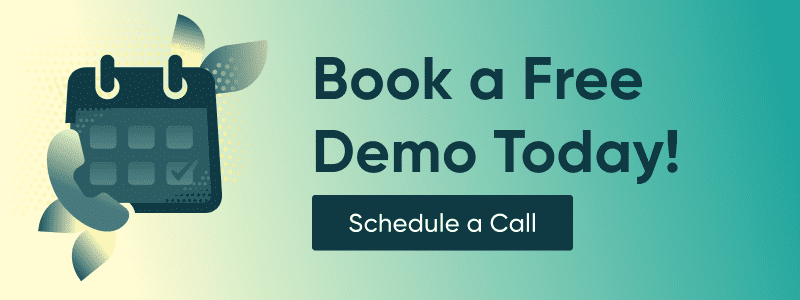OneTrust vs Drata: What's the Better Choice? [Expert Review]
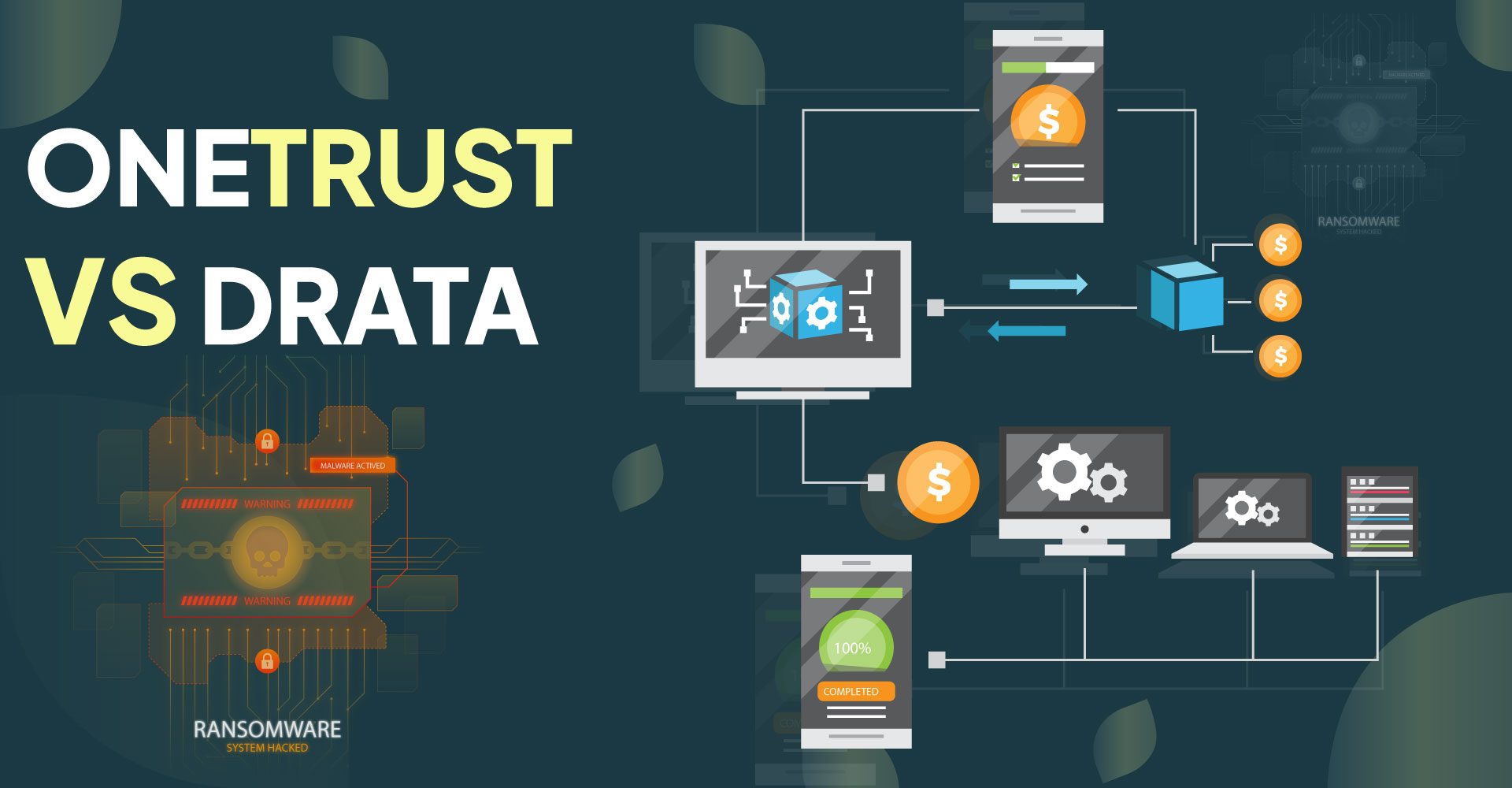
Table of Contents
OneTrust vs Drata
The main difference between OneTrust and Drata is that Drata specializes in continuous compliance solutions, while OneTrust provides a more comprehensive platform for privacy, security, and data governance.
The two platforms have much in common, and buyers may find themselves stuck trying to decide between them. Below, we're putting a spotlight on these two platforms and comparing their features. Although the two are similar, each has some distinct characteristics worth noting.
We also reveal a third option later down the post to consider for your data privacy needs. Spoiler: It's Enzuzo, which ships with many of the same features of both OneTrust and Drata at a fraction of the price tag.
What are OneTrust and Drata?
Both OneTrust and Drata are software-as-a-service (SaaS) solutions that help companies take charge of organizational compliance, which is a critical goal in 2023.
OneTrust was launched in 2016 as a way to improve compliance operations beyond the options already on the market. OneTrust’s CEO, Kabir Barday, was a privacy attorney who foresaw great changes to the emerging digital privacy landscape. Mandates like the European Union's General Data Protection Regulation (GDPR) or California’s Consumer Privacy Act (CCPA) have required companies to give users more control of their data, and OneTrust’s comprehensive approach has made them a mainstay in data governance.
Drata was founded in 2019 by co-founders Adam Markowitz, Daniel Marashlian, and Troy Markowitz. This entrepreneurial team saw how complex and expensive ongoing compliance can be, leading them to build a new solution for data governance built on automated tools. By doing so, Drata acts as a powerful and streamlined solution for governance that prioritizes process visibility and continuous compliance management for all clients.
OneTrust Pros and Cons
OneTrust’s top strength is its rich feature set for security and compliance, with its diversity of modules earning the business of top industry brands like Deloitte, DHL, and Samsung. Its power comes from its extensibility and customization potential; while other platforms may limit their offerings to one or two core processes, OneTrust offers dedicated modules for data governance, sustainability, ethics, and security assurance.
Here are some of OneTrust's core features that stand out
1. Privacy and Data Governance
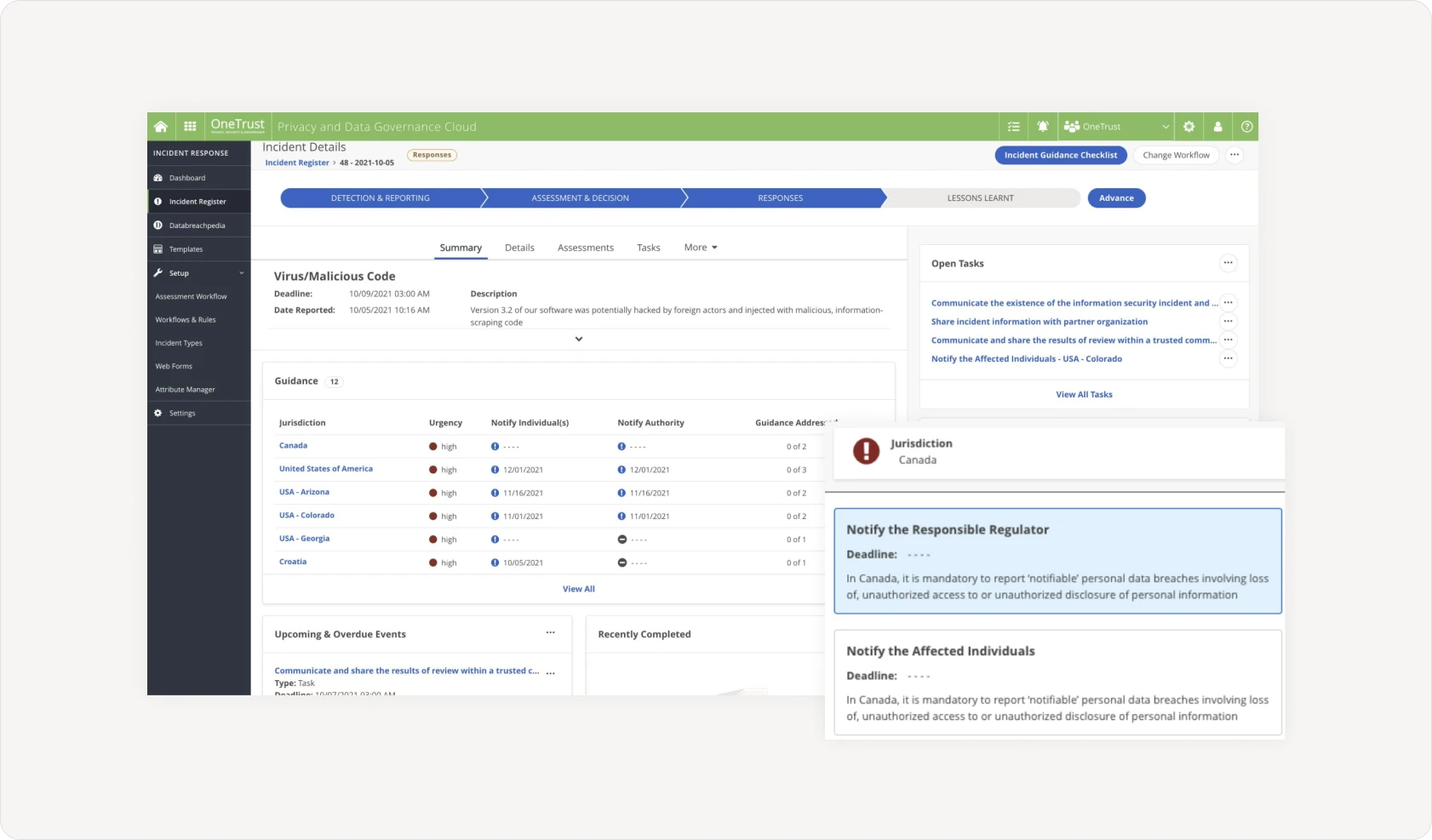
OneTrust's flagship module is its Privacy and Data Governance Cloud. This service offers tools for data mapping automation, privacy impact assessments, data discovery, and more.
2. ESG and Sustainability
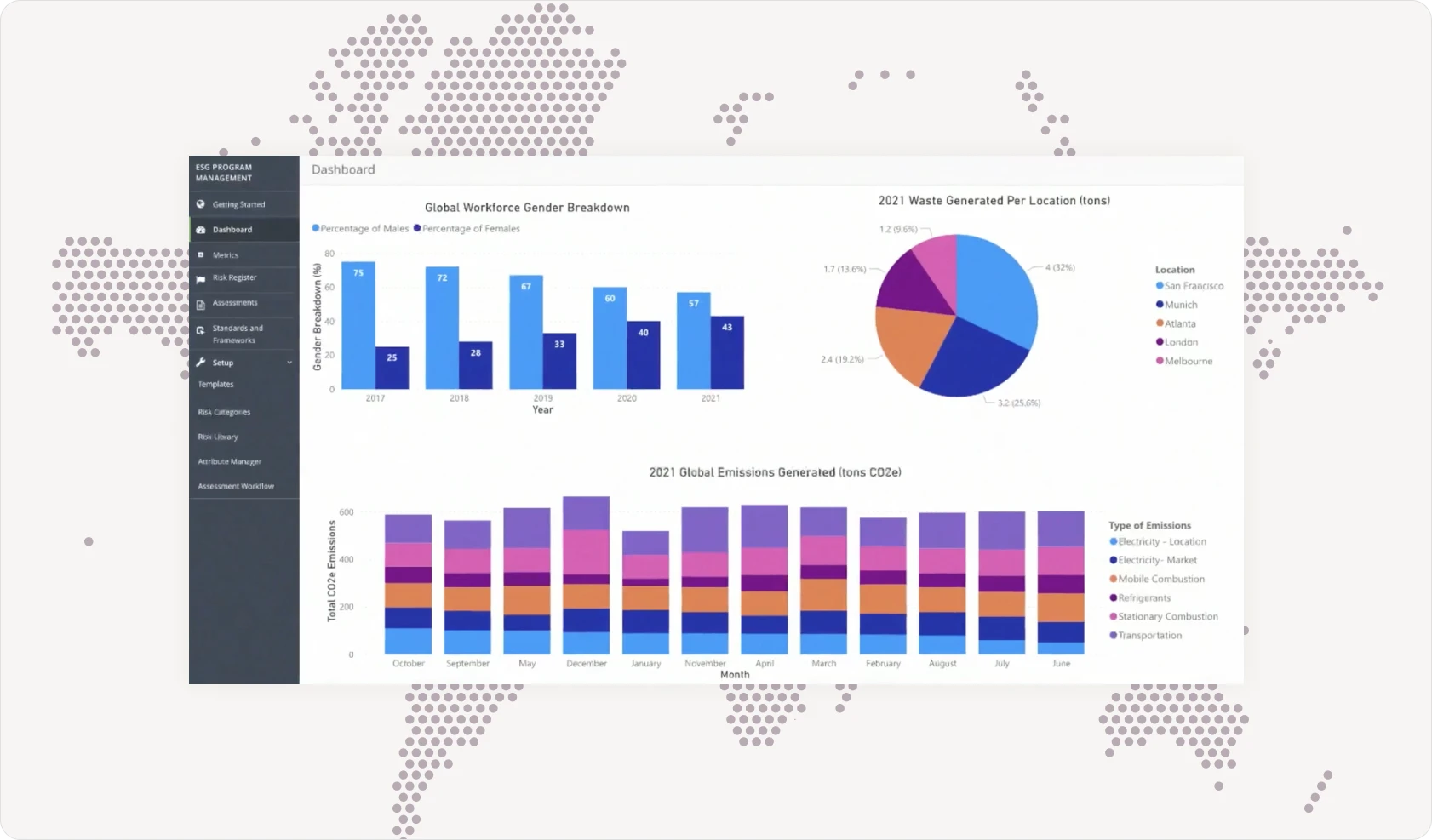
OneTrust’s Environment, Social, & Governance (ESG) module may be of particular interest to companies with set targets for green initiatives or other socially conscious mandates. This tool allows users to define core metrics and work towards actionable plans that keep the company moving toward its sustainability goals.
3. GRC and Security Assurance
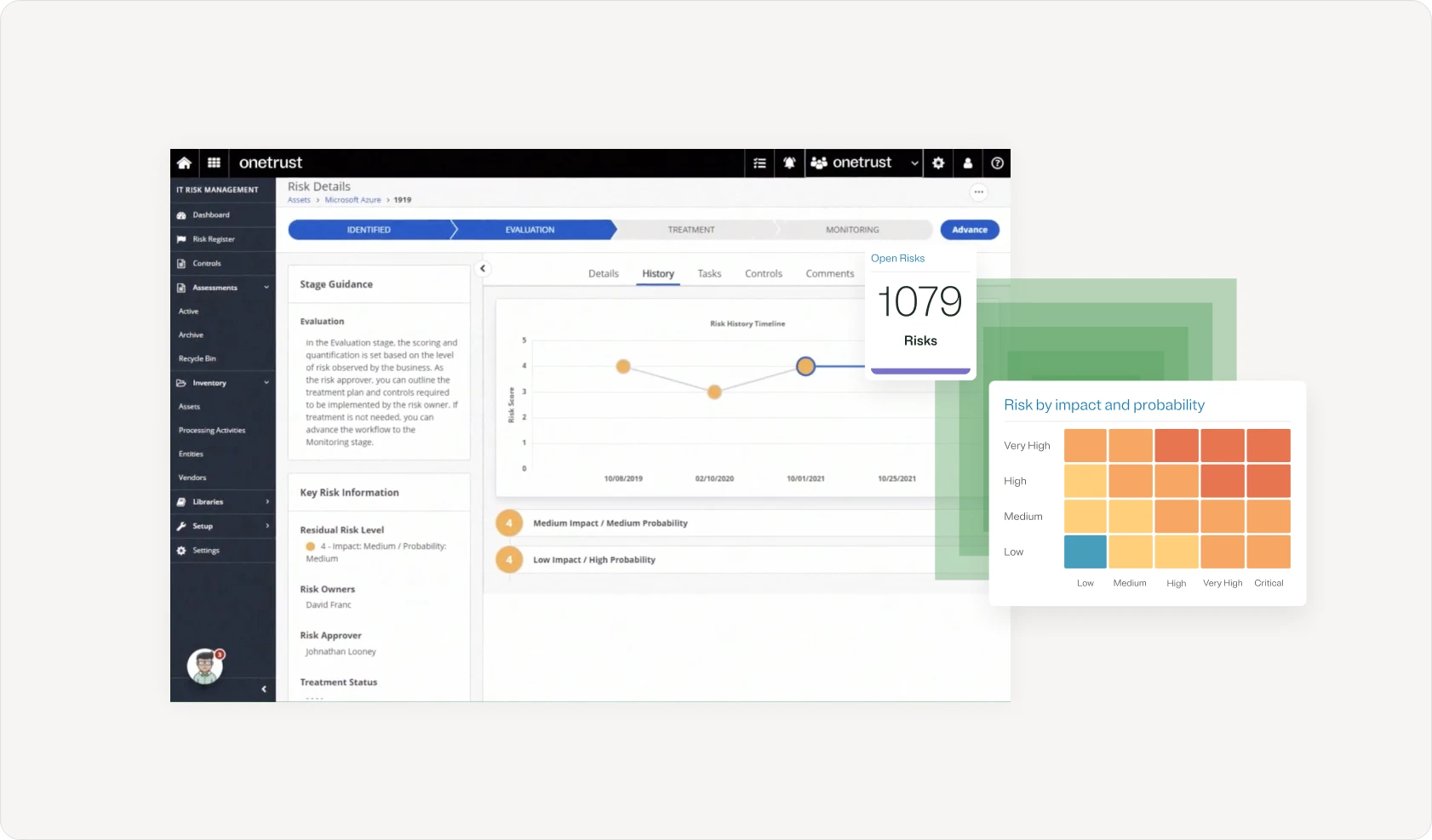
OneTrust’s GRC and Security Assurance Cloud includes a suite of great tools for third-party risk assessments, technology risk, and internal audits. Broadly, these tools help companies prepare for the unexpected and stay up-to-date with the changing digital threat landscape.
OneTrust is known for its diverse feature set, and the platform’s inherent extensibility allows users to further personalize the platform to their own needs. The platform doesn’t come cheap (which we’ll discuss in more detail below), but it stands as a powerful and reputable entry in compliance management.
Pros of OneTrust:
- Strong feature set and many options for enterprises
- Forward-thinking solution that supports a company’s long-term growth
- Excellent extensibility with other platforms
Cons of OneTrust:
- Plans are expensive and require long contractual commitments
- Users complain of poor customer support during troubleshooting
- The platform’s complexity makes it challenging to use to its fullest potential
📢 Looking for more comparisons to OneTrust? Check out our list of the top OneTrust competitors and alternatives.
Overall Thoughts on OneTrust
OneTrust is a great option for companies that can commit to long onboarding process and steep costs. While it's undoubtedly a feature-rich solution, OneTrust's large contracts may be off putting for some businesses. On top of that, some users report that OneTrust is complex to manage, with its broad feature set creating a steep learning curve for some of its functions:
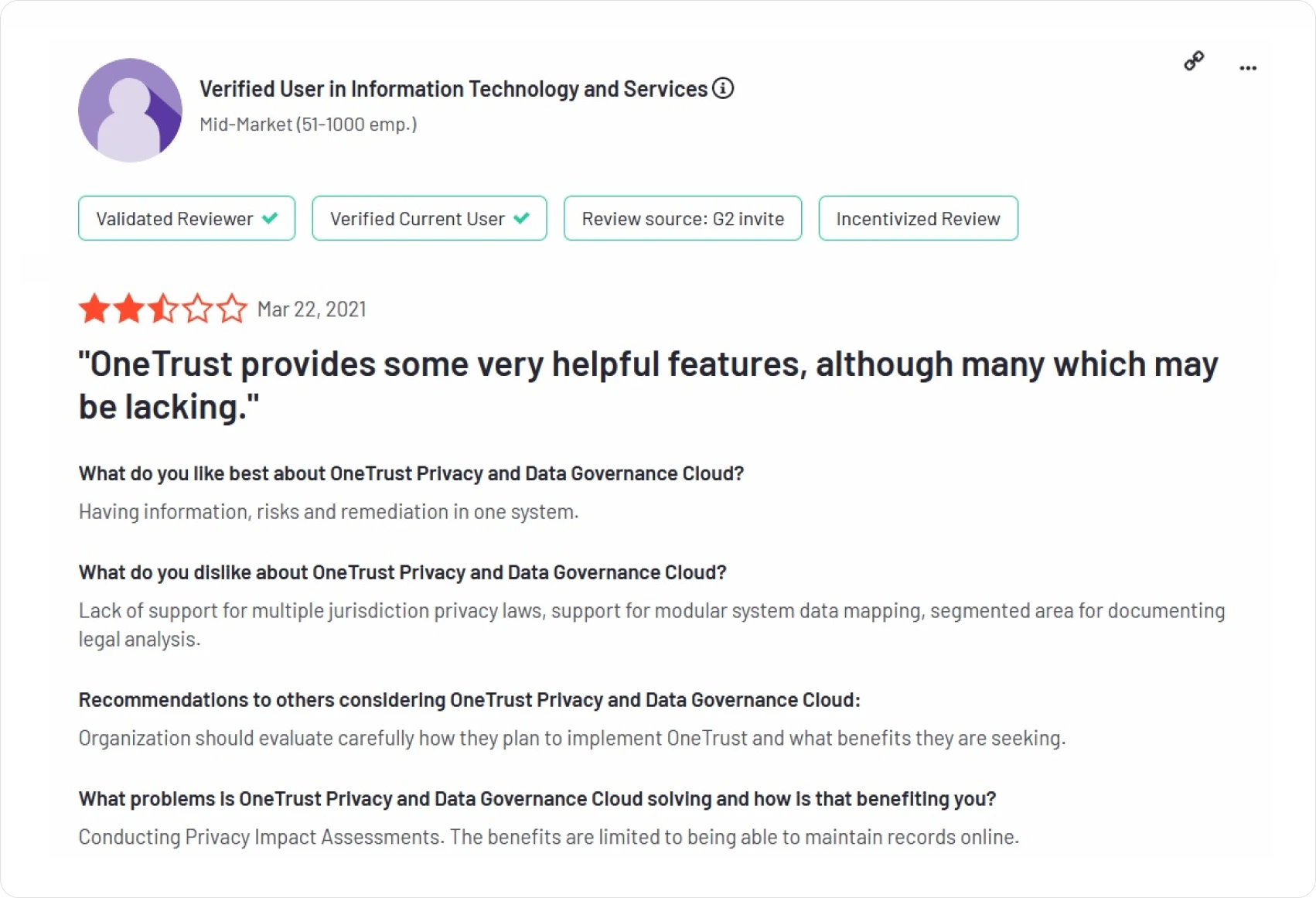
Despite these challenges, OneTrust remains a viable option for large to mid-sized companies that can commit time and resources to the platform.
Note that the average contract values for OneTrust can reach upwards of $50,000, with long-term implementation timelines that drain resources both in terms of personnel cost and time.
🏆 Verdict: Great platform for larger businesses with extra income to invest in onboarding, training, and management.
Drata Pros and Cons
Drata’s best feature is how it automates the process of compliance management, making it easier for businesses to meet various regulatory requirements, such as SOC 2, ISO 27001, and the Health Insurance Portability & Accountability Act (HIPAA).
As readers know, compliance automation can save significant effort that would otherwise be spent on manual tasks and documentation. Combined with Drata’s continuous monitoring tools and real-time dashboards, the solution represents a powerful strategy for helping companies achieve peace of mind in compliance.
Drata's top features include:
1. Automated Risk Management
Drata’s top selling point, automated risk management tools empower teams to oversee comprehensive risk assessments, streamline treatment workflows, and conduct automated testing, all within a unified platform. It’s an end-to-end compliance solution billed as one of the most innovative on the market.
2. Trust Center
Another critical feature of Drata is its trust management suite. The Trust Center enhances sales cycles by expediting security evaluations and builds trust with potential customers by showcasing relevant security data. It automatically retrieves critical security documents and information to create a single hub for all security-related workflows.
3. Audit Hub
Drata’s Audit Hub provides faster, more efficient audits by creating a centralized source for auditors. This solution minimizes the need for back-and-forth communication and allows auditors to work directly with companies during each review.
While the above represent some of the most salient features in Drata’s oeuvre, other options are available as well for vendor management, scalability, and API-based extensibility. Together, Drata provides a compelling feature set that eliminates much of the heavy lifting inherent to manual compliance.
Pros of Drata
- Innovative tools that automate compliance, from start to audit-ready
- Proprietary control libraries for building compliance across multiple frameworks
- Custom controls and policies to manage compliance in various workspaces
Cons of Drata
- The platform’s advanced features come with a high price tag
- Challenging to integrate with other security & compliance tools
- Questionable customer support & sales promises
Overall Thoughts on Drata
Drata specializes in automation technology, an approach that provides potential customers with opportunities and challenges in equal measure. Although there’s an undeniable appeal to hands-off automation, the forward-thinking technology comes at a cost. The annual starting price for Drata’s most basic plan is $7,500/year (without set up fees), though enterprise customers will likely need to splurge on either the Growth plan (at $15,000/year) or the Custom Enterprise plan (price undetermined).
It's also worth noting that, despite Drata’s overall positive reputation, some customers have had questionable experiences with the company’s customer support and sales teams:
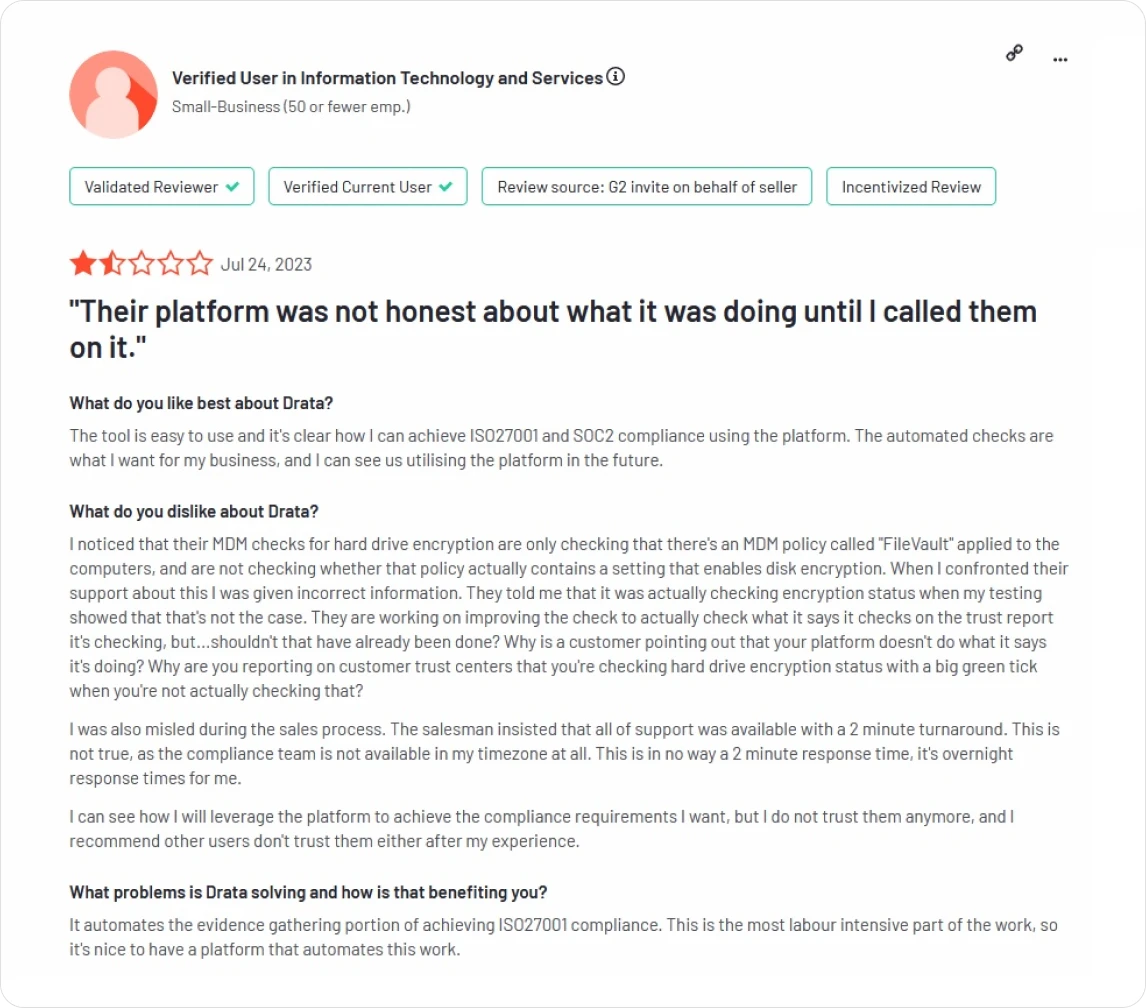
Companies should keep reviews like this in mind as they consider their options and remember to always communicate clearly with potential service providers. Creating clear expectations up front is the simplest way to ensure that compliance investments, regardless of provider, deliver the ROI they should.
🏆 Verdict: Strong candidate for companies with both resources to spare and a desire to leverage cutting-edge, albeit expensive, automation solutions.
OneTrust vs Drata: Who Wins in 2023?
Companies seeking a viable SaaS compliance solution in 2023 would do well with either OneTrust or Drata. Both platforms are effective, yet, both come with high costs and steep learning curves that will take some time to master. As such, enterprises should weigh their options carefully to prevent surprises down the line.
To help you decide, we’re putting OneTrust and Drata head-to-head in four key areas: UX, feature set, pricing, and product roadmap. Use this as your cheat sheet when comparing the two candidates.
UX & Onboarding
It’s common for users to struggle with implementation challenges when deploying expansive software, and our contenders are no exception. Both OneTrust and Drata are considered difficult to set up and optimize. In particular, users find that OneTrust’s broad feature set is hard to integrate with other solutions, with some reviews reporting substantial challenges in this area.
While Drata users report similar concerns with the UX, Drata’s more focused feature set lends itself to a shorter learning curve and fewer struggles with extensibility. In a tough call, Drata takes the win here.
🏆 Winner on UX: Drata ✅
Features
If there’s one thing OneTrust is known for, it’s the platform’s strong features. From privacy to compliance to security, OneTrust bills itself as a comprehensive solution for all things trust. And while Drata is certainly no slouch with its powerful compliance automation tools, we have to give the edge to OneTrust. Although the learning curve takes some effort to master, it pays off for those willing to invest the time.
🏆 Winner on Features: OneTrust ✅
Pricing
Both OneTrust and Drata come with sky-high costs that businesses will need to consider carefully. In particular, licensing fees for OneTrust can add substantially to the company’s investment. But unfortunately, Drata doesn’t come out ahead. With complex, bespoke pricing structures for its enterprise-level clients, Drata comes out as one of the more expensive trust solutions on the market—a fact that reflects the platform’s advanced feature set. Regardless, neither candidate truly “wins” on price in this comparison.
🏆 Winner on Pricing: Neither 🙅♂️
Get an instant quote for your business 👇
Product Roadmap
OneTrust’s commitment to developing new features for its client base is noteworthy. It's known for a strong product roadmap that continually releases new offerings for users, often based directly on customer feedback. And although Drata regularly updates its platform and policies with enhancements, its tighter, more focused suite of features means less expansion beyond its core offerings. Here, OneTrust takes the win.
🏆 Winner on Product Roadmap: OneTrust ✅
OneTrust vs Drata: Try Enzuzo Instead
Both candidates present valuable platforms for trust management, yet neither platform may precisely align with the comprehensive set of features your company requires in a compliance partner.
If this sounds like you, we encourage you to take a moment to compare a third option—Enzuzo—with the above contenders.
1. Robust Enterprise Features
Enzuzo offers a vast range of solutions for the modern business, including value-added features for medium and large-sized businesses. Advanced data compliance needs such as data mapping, record of processing activities, vendor risk management, data governance, and more are catered to in its enterprise plan. While these are not available as self-serve options, Enzuzo prices them at a steep discount to the competition.
👉 Read How Global Conglomerate Lucy Group Chose Enzuzo As Its Data Privacy Partner [2023 Case Study]
2. Fast Onboarding and Friendly UX
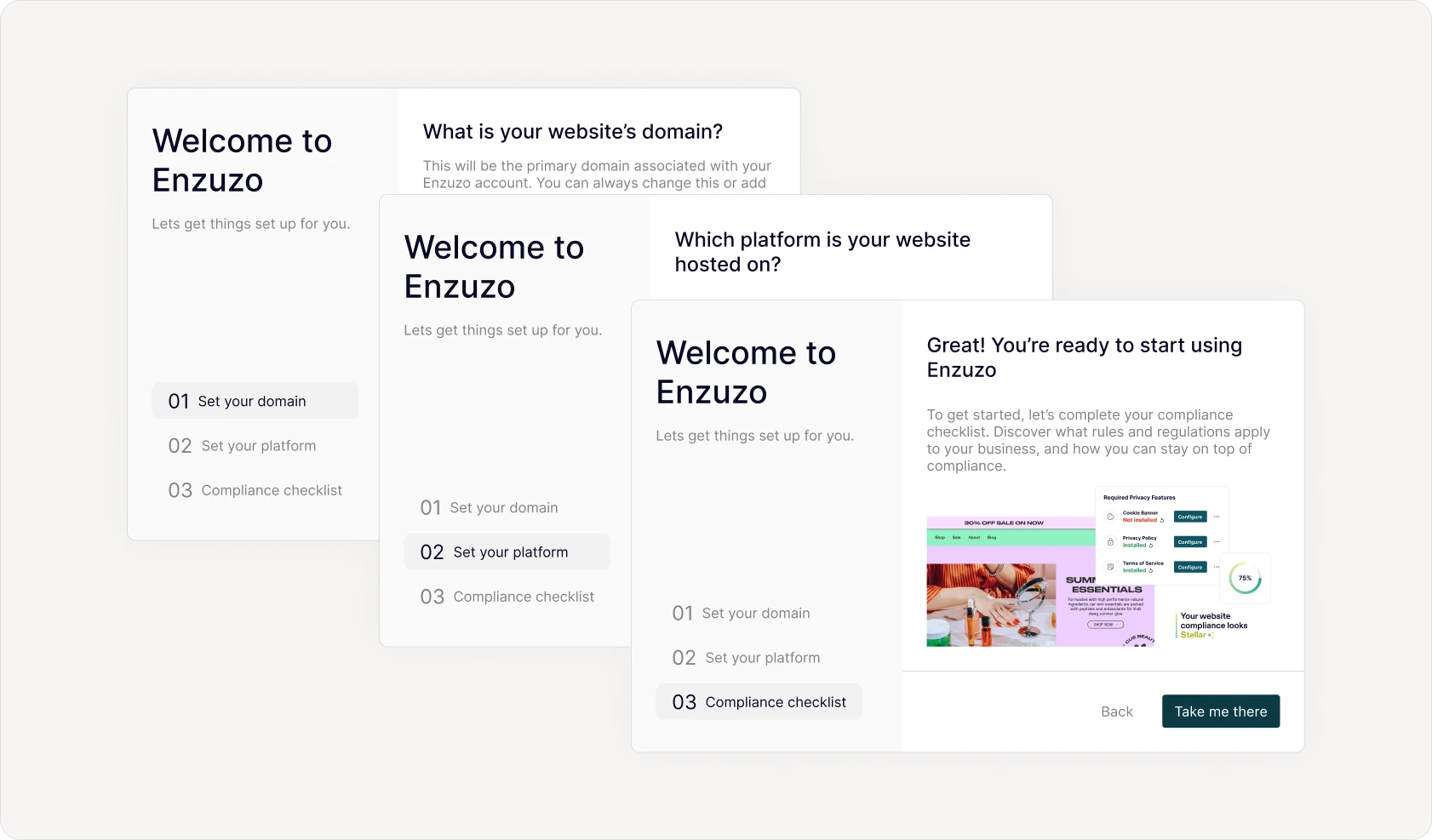
Unlike the other platforms covered here, Enzuzo is engineered to be fast, lightweight, and simple to set up. The onboarding process is remarkably straightforward, requiring only a few lines of Javascript. This translates to less time spent on platform management and more time dedicated to implementing your workflows.
In fact, Enzuzo reviews often call out the ease of implementation as a key feature:
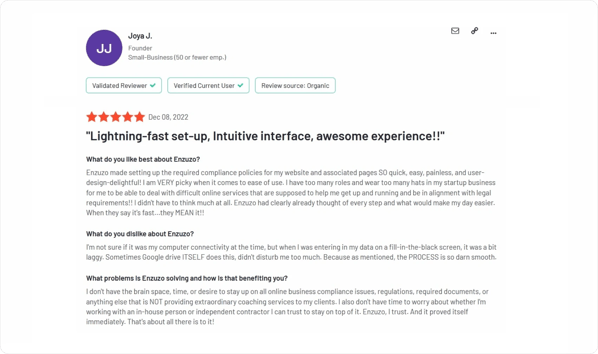
3. Affordable Pricing
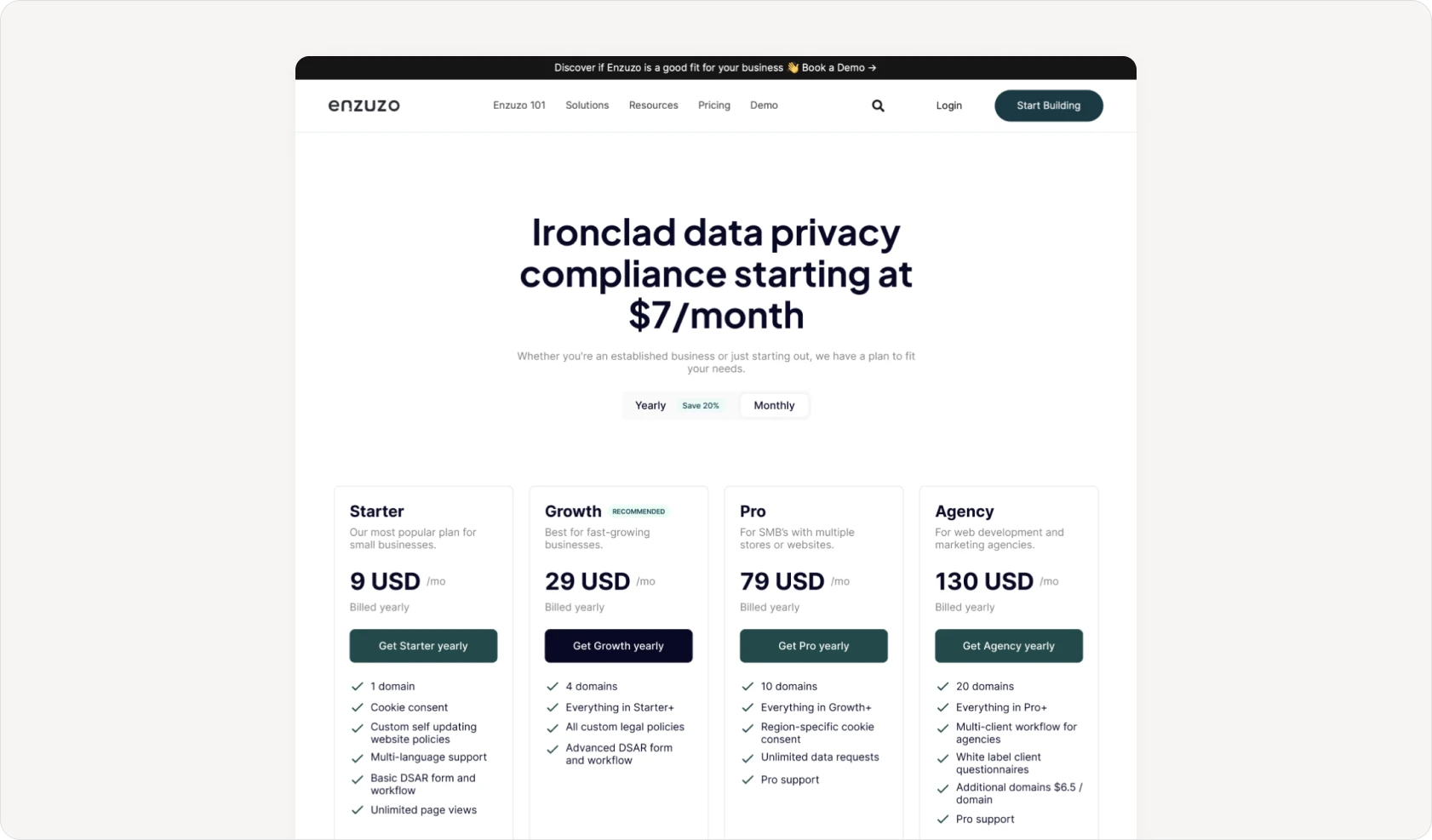
Both Drata and OneTrust come with high implementation costs across purchase, licensing, deployment, and ongoing management. For both platforms, the required investment tends to run into the hundreds of thousands.
Compare this with Enzuzo’s Growth Plan, which starts at just $29/month and includes a great suite of features that will put you on the path to compliance with GDPR and other frameworks, such as the California Consumer Privacy Act (CCPA).
And if that’s not enough, consider that Enzuzo requires no long-term contracts. With us, you’re never locked in and always free to cancel with no penalties for early termination.
4. Auto-Updating Privacy Policies and Legal Pages
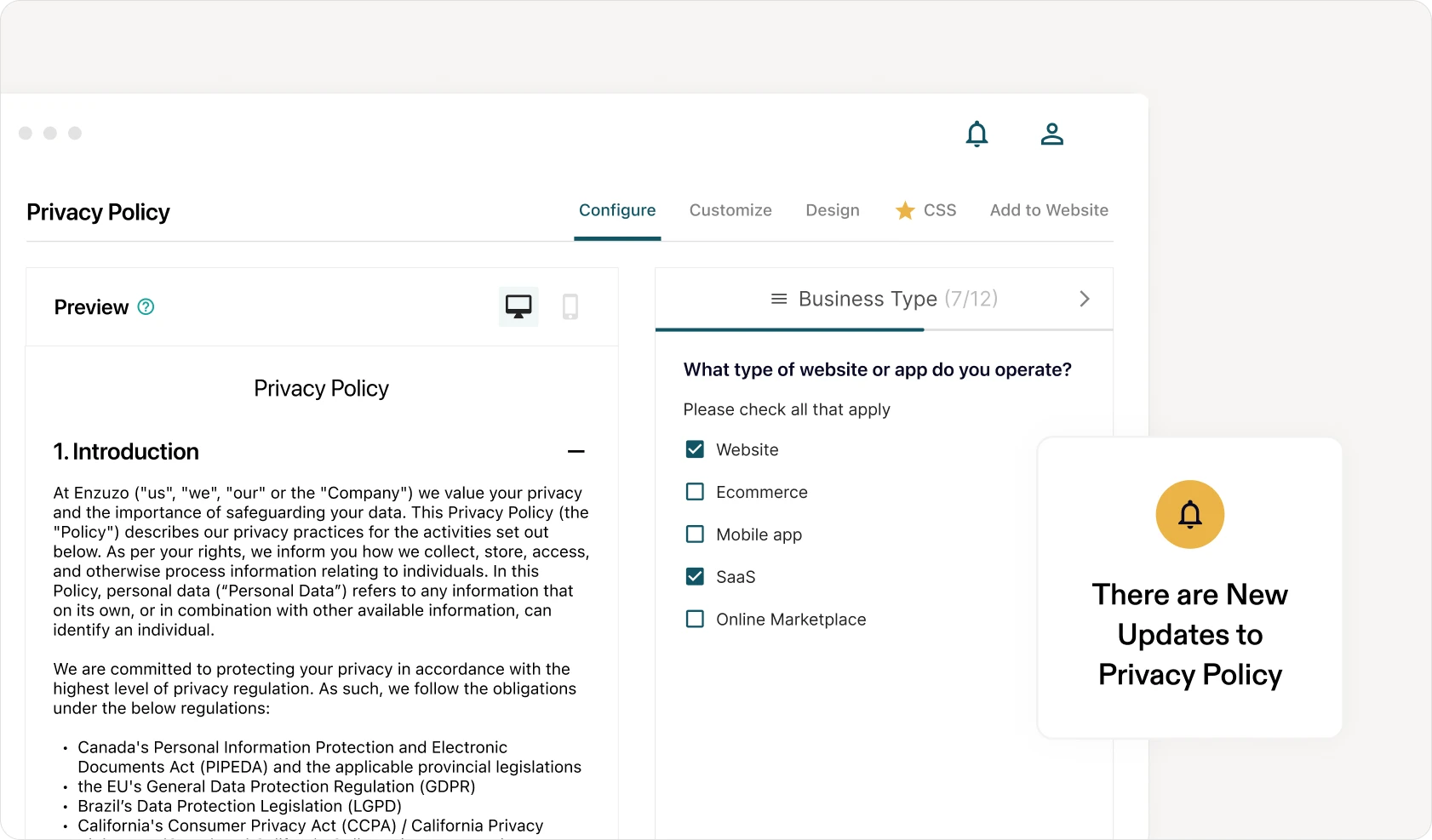
Unlike traditional policy forms that demand manual input, Enzuzo streamlines the creation of essential legal pages, such as privacy policies, through an automated generator. During the onboarding process, users simply complete brief questionnaires, and these responses are seamlessly transformed into a personalized legal document tailored to your country and the locations where your business operates.
While Drata’s tools provide great support for process automation, they fall short of Enzuzo's user-friendly and scalable system. Enzuzo takes care of regulatory requirement changes on your behalf, ensuring your compliance is always up-to-date. For true peace of mind in trust management, there’s nothing better.
5. Robust Customer Support
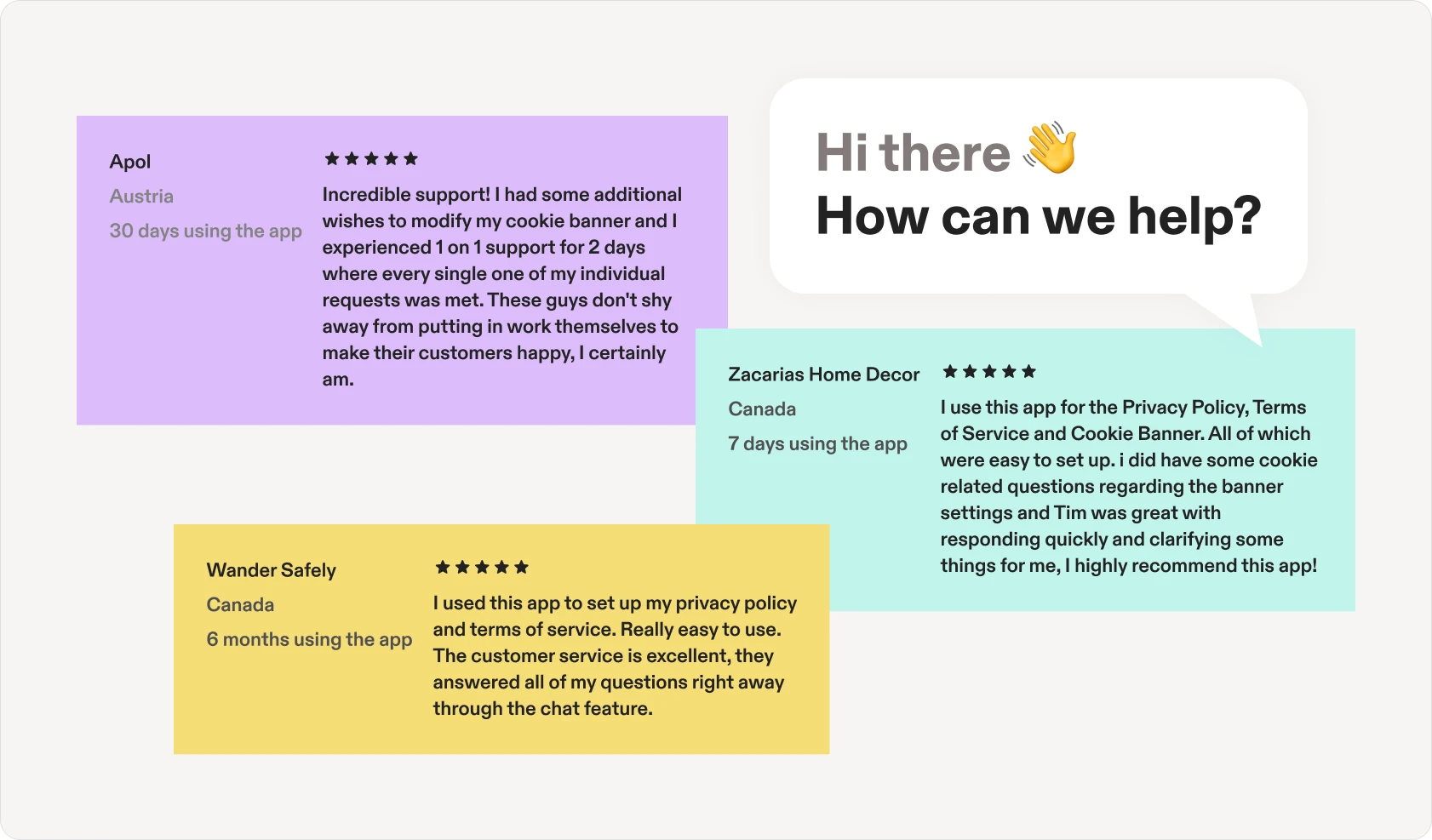
A common complaint of both OneTrust and Drata is that customer support can be unhelpful and inaccessible. No such problems with Enzuzo, that prides itself on its high NPS scores and friendly customer support. Enzuzo's clients get a premium whiteglove service, with assistance during the onboarding and migration process.
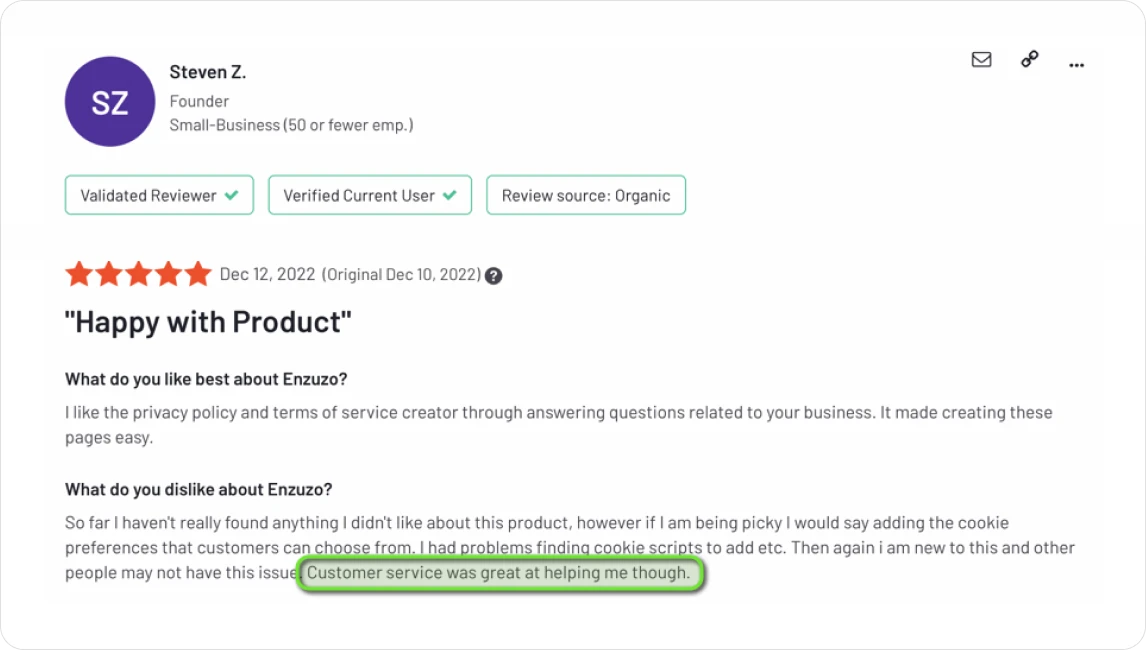
Learn more about how Enzuzo can assist with your compliance needs. Book 1-1 time with Mate Prgin, CEO👇

Osman Husain
Osman is the content lead at Enzuzo. He has a background in data privacy management via a two-year role at ExpressVPN and extensive freelance work with cybersecurity and blockchain companies. Osman also holds an MBA from the Toronto Metropolitan University.
